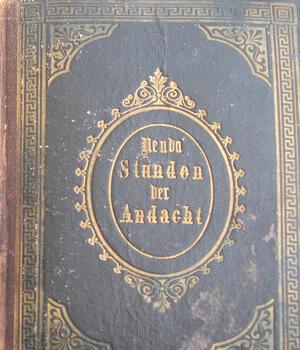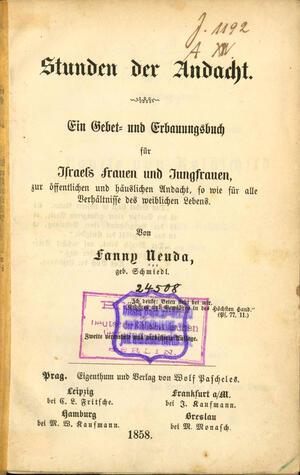Fanny Neuda
Fanny Neuda was born into a Moravian family of rabbis and acted in line with her family tradition when she published a book of prayers. The book, which was specifically aimed at women, was hugely popular. Neuda continued to write until the end of her life, emphasizing the importance of a moral upbringing for Jewish girls.
Article
Although her prayer book for women, Stunden der Andacht (Hours of Devotion), first published in 1855, remained popular and widely used until the middle of the twentieth century, little is known about its author, Fanny Neuda. Born in Eibenschitz, Moravia, on March 6, 1819, Neuda was a member of a rabbinic family. Both her father and her brother, Abraham Adolf Schmiedl, were rabbis and she remained true to family tradition by choosing to marry Abraham Neuda (b. 1812), a religiously liberal and widely educated man who served as rabbi in Loschitz, Moravia.
Abraham was himself the son of Rabbi Aaron Neuda of Loschitz and the nephew of Rabbi Jacob Neuda of Lomnitz, Moravia. When he died in 1854 at the early age of forty-two, his young widow “erected a monument of living memories”: her collection of personal prayers in book form, entitled Stunden der Andacht (Hours of Prayer) and subtitled A Book of Prayer and Moral Uplift for Jewish Women and Girls, for use in personal and domestic prayer, as well as for all occasions in women’s lives (Prague, 1855).
A best-seller that ran into twenty-eight editions, it soon became the standard women’s prayer book of its time. This is all the more remarkable because at the time of its publication in 1855 there already existed numerous examples of this form of literature, which had first appeared on the market at the beginning of the century. But in contrast to the earlier works, which were mainly composed by men, Fanny Neuda’s Stunden der Andacht was probably the first prayer book for Jewish women in the nineteenth century written by a woman. The sale record indicates the fulfillment of Fanny Neuda’s hope that her prayer texts, “the fruits of a woman’s heart,” would “find an echo in the hearts of women.”
Apart from being composed in a particularly fervent and intimate style of prayer, the texts are characterized by a conservative theology and a middle-class morality typical of the time. Thus, Fanny Neuda recommends that in bringing up Jewish girls the moral qualities of the German classics should be applied, as well as the deliberate encouragement of innate female religiosity; they should strive for “ennoblement of the heart, enhancement and strengthening of religious feeling.”
Encouraged by her success, Fanny Neuda pursued her activities as an author, publishing stories that present the world and lives of Jewish women, always with a similar educational message of edification. She died in Merano, in the Italian Alps, on April 16, 1894.
Dinah Berland, editor. Hours of Devotion: Fanny Neuda's Book of Prayers for Jewish Women. New York: Schocken Books, 2007.





